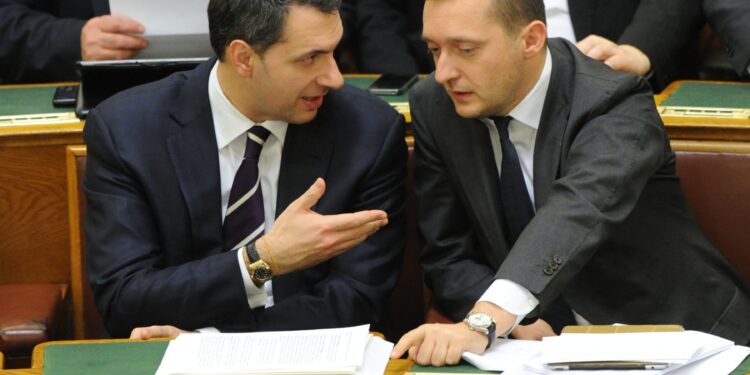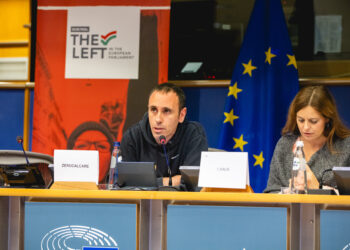Brussels–In one of the last moves of the Biden administration yesterday (Jan. 7), the United States sanctioned Antal Rogán, part of the magic circle of the Hungarian prime minister Viktor Orbán and a prominent cabinet member. According to the US ambassador to Hungary, the official allegedly was involved in a bribery scheme that he helped create to benefit himself and loyalists of the ruling party, Fidesz. Budapest rejected the accusations, announcing legal remedies as soon as Donald Trump comes into office in the White House.
With a statement on Tuesday, the State Department announced that it has designated senior Hungarian executive Antal Rogán under the global sanctions program known as the Magnitsky Act — a bill that aims to hit those responsible for human rights violations around the world (preventing them from entering US soil, freezing their assets under Washington’s jurisdiction, and prohibiting US companies from doing business with them) and named after Sergei Magnitsky, a Russian lawyer who died in 2009 in a Moscow prison, where he was detained while investigating state corruption in the Federation.
“During his tenure,” the statement reads, “Rogan has reportedly orchestrated schemes designed to control strategic sectors of the Hungarian economy,” playing “a central role in enabling a system in Hungary that has benefitted himself and his party at the expense of the Hungarian people. Rogan’s activity is emblematic of the broader climate of impunity in Hungary where key elements of the state have been captured by oligarchs and undemocratic actors,” the statement adds.
“Those closely linked to the political party in power have acquired enormous wealth,” said the US ambassador to Budapest, David Pressman, at a press conference, adding that “Antal Rogán is one of the main architects, implementers, and beneficiaries of this system of corruption.”
Today, the United States sanctioned Hungarian Minister Antal Rogán for his central role in facilitating public corruption.https://t.co/HboryOMAvu pic.twitter.com/1gC2FxaQhL
— Ambassador David Pressman (@USAmbHungary) January 7, 2025
Washington’s concerns about corruption in the central European country are not new. Congress worked for three years on the sanctions imposed on Rogán yesterday. “Today’s designation is not a decision the United States took lightly,” Pressman reiterated, noting that “it is not common for the United States to designate a sitting minister” and “even less common is to do so in an allied country.”
Rogán, an economist by training and former mayor of Belváros-Lipótváros (a municipality in the capital), has long been one of the key figures in Orbán’s government — and his system of power. Since 2015, he has worked on his election campaigns and oversaw his powerful media machine (earning him the nickname “propaganda minister”). He is currently head of the Hungarian PM’s Cabinet Office, responsible for several areas, from formal executive communications to civilian intelligence. Before joining the government, Rogán was the parliamentary group leader of Fidesz.
Naturally, Budapest immediately criticized the move by outgoing US President Joe Biden. Hungarian Foreign Minister Péter Szijjártó denounced Washington’s decision as politically motivated by Ambassador Pressman, who, over the years, repeatedly clashed with Orbán’s executives.
“This ambassador sent to Hungary by the failed American administration, but leaving from here unsuccessfully and without dignity is the personal revenge against Antal Rogán,” he posted on Facebook. “How great that in a few days we will have people leading the United States who consider our country as a friend and not an enemy,” referring to the impending handover between Biden and Donald Trump.
Under Orbán’s authoritarian leadership, Hungary has become the NATO member state closest to Vladimir Putin‘s Russia, which has led to a deterioration of relations between Budapest and Washington in recent years, especially during Biden’s tenure in the White House. According to reports by international observers, the corruption situation in the country has worsened significantly since the current prime minister returned to power in 2010.
Last year, the German association Transparency International ranked Hungary as the EU member with the highest corruption index. A view that Brussels seems to share. A few days ago, the EU executive definitively blocked over €1 billion in European funds precisely in response to the lack of reform in the area of anti-corruption. Another 6 billion remain blocked for rule of law-related risks.
English version by the Translation Service of Withub









